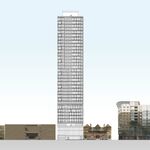I don't see why some need to have an extreme view on this stuff. Some ramblings from me, in no particular order.
I personally think Toronto is indeed the most metropolitan city in Canada, and yes I've lived in Vancouver, Toronto, and Montreal (among other places). For this reason, Toronto continues to attract a large immigrant population and there is continued growth because of that. Toronto is also the financial hub of Canada, which is not an insignificant consideration.
That said, it may be foolish to just assume all the increases in home valuations are 100% justified. There is evidence that Toronto home prices are somewhat overvalued, and when things are overvalued, there is a distinct possibility that there will be a pullback to more reasonable valuation... and then some, meaning an overshoot to the negative is also quite possible. Also, if a pullback to the expected mean is to happen, there are different ways that can happen. It can happen suddenly, with a huge overshoot, or it can be more gradual with no overshoot, or it could just mean a flat market for a number of years leading to a real pullback after inflation is considered.
As for owning a home being a "status fad" in Toronto, I'm not sure where that comes from. If anything I think people on average have become more astute over the years about the benefits of owning and the benefits of renting, even if many people still don't quite understand it. If the "status fad" of owning did exist, if anything that fad is probably waning IMHO. In fact, I'd say that sentiment is less prevalent in large cities like Toronto as compared to small cities. I grew up in a small city, and there, ownership was expected for anyone in a stable job and established. This is definitely not the case in Toronto. I have some quite well-to-do acquaintances who rent, and nobody gives a damn either way. I personally prefer to own, but that's a personal decision, and not a judgement on someone else's choice to rent.
I also don't understand why any numbers from TREB are immediately brushed off as meaningless lies by some. The numbers are the numbers. If someone thinks TREB is lying and is publishing falsified numbers, then it's up to that someone to prove it. Yes there are other ways of measuring home prices such as Teranet's method, but it's just another different method. Now you're free to ignore TREB's spin on those numbers, but that's a different matter.





